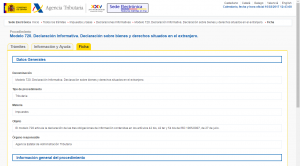Reasoned opinion of the European Commission against the “modelo 720” fines
After the claims filed in November, 2015, by foreigners residing in Spain, the European Commission has recently issued a reasoned opinion requesting Spain to change its rules on assets held in other EU or the European Economic Area (EEA) Member States (so-called “Modelo 720”), as the fines charged for failure to comply are dimed disproportionate.
As we also said in a previous article on the “modelo 720”, there was 2 questions on which the claims were based:
– The disproportionality of the established sanctions.
– The extension of the statute of limitations regulating article 39 of the Personal Income Tax Law and article 134 of the Corporate Income Tax Law.
After a long wait of more than one year, the opinion issued by the European Commission argues that, though Spain has the right to require taxpayers to provide its authorities with information on certain assets held abroad, the fines charged for failure to comply are disproportionate, and that this situation may deter both businesses and private individuals from investing or moving across borders in the single market, entering in conflict with the fundamental freedoms in the EU. However, it does not say anything concerning the second aspect of the claims.
With this opinion, the European Commission requires Spain to modify the sanctioning regulation for modelo 720, giving the country a deadline of two months to present its arguments, but it also warns that it may refer the case to the Court of Justice of the EU if no answer is received.
As a consequence of this EC resolution, we hope that the Spanish regulation of the modelo 720 changes, and thus unlocks a situation involving taxpayers, many of them foreigners, who are supposed to file the modelo 720 for tax year 2012 but who haven’t done so yet. A solution should be found for these people in order to regularize their situation without seeing their assets substantially decreased because of the high fines they would have to pay for not having filed a tax return that – let’s remember – is merely informative.
However, it is possible that the Spanish state does not change the regulation, so the case would then go to the Court of Justice of the European Union, which would imply more delay in the resolution of the claims and the long-awaited modification of the modelo 720’s regulation.
The complete opinion issued by the European Commission can be read here: MEMO/17/234.
Written by Roberto Antunez, Lawyer and Tax Advisor, Adarve Abogados


Comments are closed.